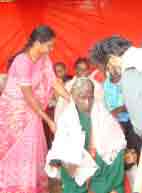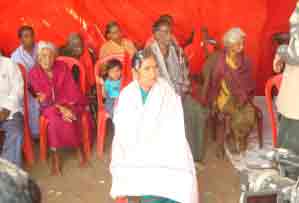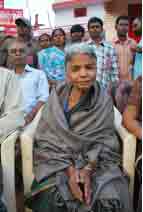SPECIAL REPORT
Women recall tumultuous times
(Following the CC Meeting, Comrade Ramji Rai spoke to some of the women of Boddapadu whose loved ones were killed at the hands of the police at the time of the Srikakulam movement. These conversations were facilitated by CPI(ML)’s Andhra Pradesh Committee members Comrades Aruna and Comrade Ravi, and Comrade Rama Rao who translated from Hindi to Telugu and vice versa.)
Thamada Polamma (72 years old, wife of Thamada Ganapati Raju): I was married with much fanfare when I was 12 years old. Our first child, a son, Trilochan was born 4 years later and another son, Madhusudhan, 5 years after that. Then 3 years later our daughter, Aruna was born. I looked after the children at home. Ganapati was completely involved in thinking, talking and agitating over problems faced by the villagers. He was the only child of his parents, so his involvements in politics meant that someone else had to care for our household. I used to dissuade him from political work, that wasn’t about to stop him. I used to be sad because of this and also was mostly ignorant about what was happening, so would quietly accept his ways. It was very difficult to bring up children alone. You can imagine how one manages a family without the husband. Still, I bore up quietly. Eventually, I even stopped trying to dissuade him. We were so poor that there wasn’t even oil to put in my children’s hair. We were always short of food and on top of that, if he brought friends home, I had to somehow manage for them too! In spite of all this, I was beginning to feel that whatever he was doing was right.
1968-69, when struggles in the area intensified, was also the time of severe police repression. People ran away from the village for a few days. Ganapati was visiting another village for a campaign. In these days, Subbarao Panigrahi, Nirmala and others were organizing a rally in our neighbouring village, Garudbhadra. Its zamindar, Maddi Kameshwar, who was a Congressman, was trying to disrupt the rally. He caught hold of Nirmala’s hand. A fight ensued in which Subbarao Panigrahi was badly injured. The protesters retaliated by harvesting the zamindar’s crops. The very next day the police was let loose on us. Ganapati, when he came to know of it, felt the escalation of the confrontation could have been avoided. But what had to happen had already happened.
Aruna was very young then. I took her into hiding at a hill called Pendkonda, 3 kms away from the village. We all hid in the forests there. Villagers (who till then had been aloof from the party) carried food to us hidden in their lotas (pretending to carry water when they went out to defecate in the open). Ganapati came to meet us at our hiding place. Then he altogether left home and went underground. I returned to the village with Saraswati and Nirmala Panchadri, after 5 days. I, then left the village and moved to Buddepalli, near Srikakulam where I lived at a teacher’s house. His name was Pollai Master. Nirmala and Saraswati were also with me.
The situation in the village was very bad. Several people were arrested and beaten up. Even children and pregnant women were not spared. Ganapati visited the village a couple of times but we could not meet. The situation was so oppressive that villagers had started cursing Ganapati, blaming him for it. But still, no one in the village gave away his hideout or our location to the police, even though they knew his and our location full well. We regularly changed locations and never stayed at one place for too long. We met him once or twice after he was underground. In our last meeting, our three children were present with me. He just looked at them once; did not say anything, just looked at them and went away.
When I received the news of his death, it was as though my heart would burst. But I kept my tears tightly within myself, knowing that to cry would be to give away that I am Ganapati’s wife. Changti Rao Bhasar was also martyred with him. Nirmala and Saraswati were underground by this time. I was at my mother’s place.
I gradually accepted the situation and began to think of the future. Increasingly, I was convinced that this path was the right one. I myself live by walking on that same path. My youngest child Aruna is also an activist, that is good to see. I brought Aruna up with great difficulties and I am proud that she has chosen to follow her father’s footsteps. I tell her and everyone else that her father’s activism should be her model. 
After his death, a minister of the Congress government came and declared compensation for us. I refused outright. Only then were the police able to find out that I was Ganapati’s wife. They were amazed - all their efforts so far to dig out information about us from the villagers had failed! That’s the kind of place our Boddapadu is.
Dunna Rajamma (above 80 years, mother of Gopal):
He was 17 years old then and studying in the 10th standard. He along with 6 others including Panchadri Krishnamurthy (Nirmala’s husband), and Papa Rao, were shot dead by the police. He had actually been arrested with 11 others at Kanchla railway station on his way back from Kolkata. 7 of them were taken to a nearby hill and shot dead.
I raised him to study so that he might have a decent job and then care for us. But he spent more and more time with Ganapati and Subbarao. I tried to stop him from getting involved but he would smile and say that we must work for poor people’s rights and that it was our duty to do so. The police came to know about him and he was soon arrested. He managed to escape but was rearrested in 10-15 days. The police tied his hands and legs and threw him in jail. He was then released on bail. This happened twice. We sent him away to Kolkata hoping to keep him away from the party. But he came back. We sent him off to Bhilai but he again returned and this time joined the party in earnest. I was scared for him that if he remained in contact with Ganapati, Subbarao and Krishnamurthy, he would be killed by the police. No matter what I said, he would try to explain to me that I must not be angry nor blame anyone. And that I must not cry even if he were to die. I realised that nothing would stop him now.
The Pledge Campaign
Throughout the month-long Pledge Campaign from December 18 2008 to January 16 2008, meetings were held at every level of the party all over the country. Comrades took to heart the call to reach out to every party member, with the pledge to “Grasp the Situation and Grab the Opportunities! Consolidate and Expand the Gains on All Fronts! Strengthen the Party and Unleash the Full Initiative of the Entire Organisation!”
At Tamil Nadu, the Pledge Campaign was followed by a State Cadre Meet on 17–18 January in Tindivanam, to review the Campaign. As part of the Cadre Meet, a class on ‘Crisis of Capital and the Response of the Proletariat’ was held, addressed by Arindam Sen, CCM, and Editor, Liberation. A similar class was also held on 19 January at Vijaywada, Andhra Pradesh.
|
I wept and screamed when I heard that he was killed. I lived with my remaining four sons, but would still cry even after 10 years of Gopal’s death. My heart still cries out for him. That’s just how he was. Even as a child he helped me in daily chores of the house. I forever feel that he should have been here…he should have lived, but he is no more. All those who went underground were killed. If they were living, our village, our country would have been a better place. Their struggle has infused dignity to our lives. They did nothing wrong and have rather made us proud. Nowadays people are selfish, too busy with themselves. There are few as cheerfully brave, as eager to think about others, as he was. I want more people to be like him.
Apalamma (85 years old, mother of Madanala Dushyant): We thought he would support us in our old age, but he is no more. A second son was born, he too died. My mother and I pooled in our resources to send him to Srikakulam to study for PUC. People asked what was the point of educating him, and said – You’ve got no money, how will you educate him? But he wanted to study and I decided to help him, no matter what. He was studying in Srikakulam when the Garudbhadra incident happened. He immediately returned to the village and went underground with Ganapati and Panigrahi. He never returned home. He was martyred in 1974, after being turned in by an informer. A villager had succumbed to torture and turned informer.
He was a very good student and I always encouraged him. I used to send him to Srikakulam with money. Thrice he went there but the fourth time he did not reach Srikakulam. When I came to know of this, I went to Srikakulam to enquire after him, but he was not to be found. He was underground with other party members. I was never able to know what he thought and felt. He was very fond of saag and khichdi. He used to teach young kids. I did not get to see him after his death. The police did not even give us his body. I sold everything so that he could study, have a future. I felt the villagers ruined my son’s, ruined my whole life. I went crazy, still am like that. But I realize that he still lives in people’s hearts and minds. Even today, they remember him with respect and love. I too, gaze at his photograph everyday and salute him. I had thought he would salute me, but it is the other way around now. He lived and died in a manner that thousands of people remember him.
Surekha Panigrahi (about 70 years old, wife of cultural activist Subbarao Panigrahi): We came to Kotapalli village in Sompeta within a year of our marriage. He taught tuitions before marriage. At Sompeta, he worked as a contractor for road works. He was already in touch with the Communist Party before coming to Boddapadu. Majji Tulsidas was a Communist at Sompeta and he began spending time with him, and met Ganapati through him. The temple at Boddapadu required a priest to run it and Ganapati arranged for him to get the job. So we shifted from Sompeta to Boddapaddu. Subbarao began holding harikathas in the village; he started classes for village children. In the process he started writing songs and poems. He also dispensed basic medicines etc. His involvement in the party grew and he began spending less time at home. He would not tell me anything and when ever I enquired he simply kept on working quietly. His involvement grew to the extent that my brother had to be called in to work as the priest. We knew that he was working with the Communist Party but he would assure us that there is nothing to worry about. I tried to stop him. I cried, argued and even fought with him. He never got angry with me but neither did he turn from his path. He would only say that nothing would happen, he would soon be back, and I was worrying unnecessarily. Whenever he could not come, he would request a village girl to spend the night at our home so that I should not be alone. We managed to run the house from temple donations but… (her eyes filled with tears).
Yes, whenever he would sing at meetings or on stage, I always went with everyone else to hear him. The songs made me feel good. His voice would become heavy and break a little whenever he sang spiritedly. I could not understand everything in the songs but hearing them still made me feel good. I still remember 2 of his songs:
‘Who on earth would believe if anyone claimed that the drumstick is a strong tree? But if the Babus say so, we are forced to agree.’
‘We work hard, face hardships yet have no food, no dignity. Friend, where do you go alone? Nothing can be achieved alone. Our struggles will bear fruit if we are all together. Wait, my brother! We are also coming with you.’
He did not come home when he was injured at Garudbhadra, but stayed at a neighbouring house. Like others, I too went to see him, but we did not talk. He went out again as soon as he recovered. He never came back. Like other villagers, I too left the village for my parents’ house when police repression began. The police reached my parents’ house, took me away for questioning and later released me. When Subbarao came to know of this he came to meet me in disguise at 1 in the morning and left before dawn. He was accompanied by another man. I insisted on coming with him but he refused saying that it would be better if I stayed where I was. He went away without me and I never saw him after that. I had no news of him. The first news that reached me was of his death. It struck me like a thunderbolt. My family stayed with me all the time, fearing that I would commit suicide. Really, I did not wish to live anymore. Who was there to live for? We had no children. Two years passed. He earned a great name, but I feel that if he was around, I would have been content just being able to look at his face.
The villagers brought me from my parent’s home back to Boddapadu. I was given charge of the temple and settled here by the villagers and I have remained here. Seeing these villagers who were his people, I am alive. The one who is gone is gone, but I find him in the villagers who love him. Now that he is no more, I could realize full well what he was! It is 40 years now and would I not know now, when I see so many people come here to pay respects to him? Seeing all of you, wouldn’t I know even now what he stood for? Now I know, now I understand!
(Her eyes are quite wet, and there’s a slight quaver in her voice.) When I asked him he never told me anything, and now that he has done his work and gone, he has told me everything without uttering a word: through thousands of voices. He lives in thousands of people. People die natural deaths in their homes; what if he had died that way. But his death seems sweet – and great.


